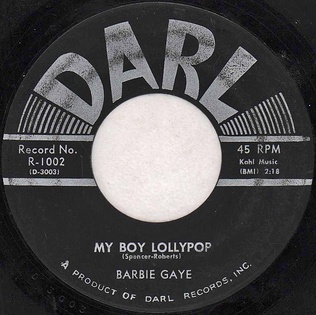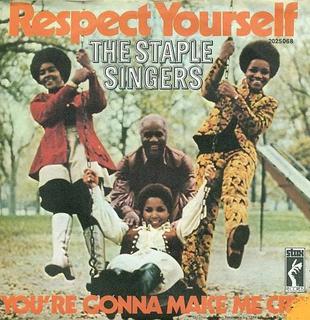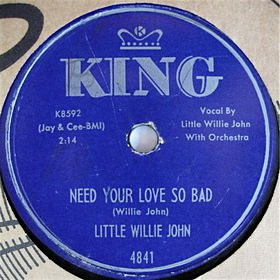Rhythm and blues, frequently abbreviated as R&B or R'n'B, is a genre of popular music that originated in African-American communities in the 1940s. The term was originally used by record companies to describe recordings marketed predominantly to urban African Americans, at a time when "urbane, rocking, jazz based music ... [with a] heavy, insistent beat" was becoming more popular. In the commercial rhythm and blues music typical of the 1950s through the 1970s, the bands usually consisted of piano, one or two guitars, bass, drums, one or more saxophones, and sometimes background vocalists. R&B lyrical themes often encapsulate the African-American experience of pain and the quest for freedom and joy, as well as triumphs and failures in terms of relationships, economics, and aspirations.

Doo-wop is a genre of rhythm and blues music that originated in African-American communities during the 1940s, mainly in the large cities of the United States, including New York, Philadelphia, Pittsburgh, Chicago, Baltimore, Newark, Detroit, Washington, DC, and Los Angeles. It features vocal group harmony that carries an engaging melodic line to a simple beat with little or no instrumentation. Lyrics are simple, usually about love, sung by a lead vocal over background vocals, and often featuring, in the bridge, a melodramatically heartfelt recitative addressed to the beloved. Harmonic singing of nonsense syllables is a common characteristic of these songs. Gaining popularity in the 1950s, doo-wop was "artistically and commercially viable" until the early 1960s, but continued to influence performers in other genres.

William Clarence Eckstine was an American jazz and pop singer and a bandleader during the swing and bebop eras. He was noted for his rich, almost operatic bass-baritone voice. In 2019, Eckstine was posthumously awarded the Grammy Lifetime Achievement Award "for performers who, during their lifetimes, have made creative contributions of outstanding artistic significance to the field of recording." His recording of "I Apologize" was given the Grammy Hall of Fame Award in 1999. The New York Times described him as an "influential band leader" whose "suave bass-baritone" and "full-throated, sugary approach to popular songs inspired singers like Earl Coleman, Johnny Hartman, Joe Williams, Arthur Prysock, and Lou Rawls."

Robert Allen Palmer was an English singer-songwriter, musician and record producer. He was known for his powerful, soulful voice and sartorial elegance, and for his stylistic explorations, combining soul, funk, jazz, rock, pop, reggae, and blues. While his "four-decade career incorporated every genre of music", Palmer is best known "for the pounding rock-soul classic, "Addicted to Love", and its accompanying video, which came to epitomise the glamour and excesses of the 1980s."

The Manhattan Transfer is a Grammy award–winning vocal group founded in 1969 that has explored a cappella, vocalese, swing, standards, Brazilian jazz, rhythm and blues, and pop music.

Donny Edward Hathaway was an American soul singer, keyboardist, songwriter, and arranger whom Rolling Stone described as a "soul legend". His most popular songs include "The Ghetto", "This Christmas", "Someday We'll All Be Free", and "Little Ghetto Boy". Hathaway is also renowned for his renditions of "A Song for You", "For All We Know", and "I Love You More Than You'll Ever Know", along with "Where Is the Love" and "The Closer I Get to You", two of many collaborations with Roberta Flack. He has been inducted into the St. Louis Walk of Fame and won one Grammy Award from four nominations. Hathaway was also posthumously honored with a Grammy Lifetime Achievement Award in 2019. Dutch director David Kleijwegt made a documentary called Mister Soul – A Story About Donny Hathaway, which premiered at the International Film Festival Rotterdam on January 28, 2020.

Edward James Kendrick, better known as Eddie Kendricks, was an American singer and songwriter. Noted for his distinctive falsetto singing style, Kendricks co-founded the Motown singing group the Temptations, and was one of their lead singers from 1960 until 1971. He was the lead voice on such famous songs as "The Way You Do the Things You Do", "Get Ready", and "Just My Imagination ". As a solo artist, Kendricks recorded several hits of his own during the 1970s, including the number-one single "Keep On Truckin'".
City Boy were an English rock band formed in the mid-1970s. They were originally called Sons Of Doloyne, then Back In The Band, and finally City Boy. They featured strong melodies, clever lyrics, complex vocal arrangements, and heavy guitars. The band consisted of Lol Mason, Steve Broughton, Max Thomas, Chris Dunn, Roger Kent (drums), Mike Slamer, and later, Roy Ward. Their most popular songs were "5.7.0.5.", "What a Night", "The Day the Earth Caught Fire", and "Speechless".
Mark Howard James professionally known as The 45 King, is an American hip hop record producer and disc jockey (DJ) from The Bronx borough of New York City. James began DJing in The Bronx, in the mid-1980s. His pseudonym, the 45 King, came from his ability to make beats using obscure 45 RPM records.

The Five Stairsteps, known as "The First Family of Soul" and later "The Invisible Man's Band", was an American Chicago soul group made up of five of Betty and Clarence Burke Sr.'s six children: Alohe Jean, Clarence Jr., James, Dennis, and Kenneth "Keni", and briefly, Cubie. They are best known for the 1970 song "O-o-h Child", listed at number 402 on Rolling Stone's 500 Greatest Songs of All Time.

Mildred Virginia Jackson is an American R&B and soul recording artist. Beginning her career in the early 1960s, three of Jackson's albums have been certified gold by the RIAA for over 500,000 copies sold. Jackson's songs often include long spoken sections, sometimes humorous, sometimes sexually explicit. She recorded songs in an R&B, disco, or dance-music style and occasionally in a country style.

Ruby & the Romantics were an Akron, Ohio-based American R&B group in the 1960s, comprising Ruby Nash, George Lee, Ronald Mosely, Leroy Fann and Ed Roberts.
Fifty Foot Hose is an American underground rock band that formed in San Francisco in the late 1960s, and reformed in the 1990s. They were one of the first bands to fuse rock and experimental music. Like a few other acts of the time, they consciously tried to combine the contemporary sounds of rock with electronic instruments and avant-garde compositional ideas.
"Jumpin' Jive" is a famous jazz/swing composition, written by Cab Calloway, Frank Froeba, and Jack Palmer. Originally recorded on 17 July 1939, on Vocalion Records, it sold over a million copies and reached #2 on the Pop chart. Calloway performs the song with his orchestra and the Nicholas Brothers in the 1943 musical film Stormy Weather.

"My Boy Lollipop" is a song written in the mid-1950s by Robert Spencer of the doo-wop group The Cadillacs, and usually credited to Spencer, Morris Levy, and Johnny Roberts. It was first recorded in 1956 by American singer Barbie Gaye under the title My Boy Lollypop. A later version recorded by Jamaican singer Millie Small in 1964, with very similar rhythm, became an international hit that time and is one of the first songs to introduce ska music.

Leon "Lenny" Welch is an American MOR and pop singer.
Bad Boy is a song written by Lil Armstrong and Avon Long. It became a hit for The Jive Bombers in 1957. The song has since been covered by The Escorts, Mink DeVille, Ringo Starr, Sha Na Na, Maryann Price, David Johansen performing as Buster Poindexter, and others, and was used in the first-season finale of the television show "Crime Story" as well as in the 1990 film Cry-Baby. The Mink DeVille version was included in the 1983 film Breathless.
Allen Tinney was an American jazz pianist.

"Respect Yourself" is a song by American R&B/gospel group the Staple Singers. Released in late 1971 from their album Be Altitude: Respect Yourself, the song became a crossover hit. The Staple Singers' version peaked at No. 12 on the Hot 100, No. 2 on the Hot Soul Singles chart, and is one of the group's most recognizable hits. In 2002, the song was inducted into the Grammy Hall of Fame, and in 2010 it was ranked #468 on the Rolling Stone list of the 500 Greatest Songs of All Time, moving down 4 spots from #464 in 2004.

"Need Your Love So Bad", sometimes known as "I Need Your Love So Bad", is a song first recorded by Little Willie John in 1955. Called a "unique amalgam of gospel, blues and rhythm & blues", it was John's second single as well as his second record to reach the US charts.












